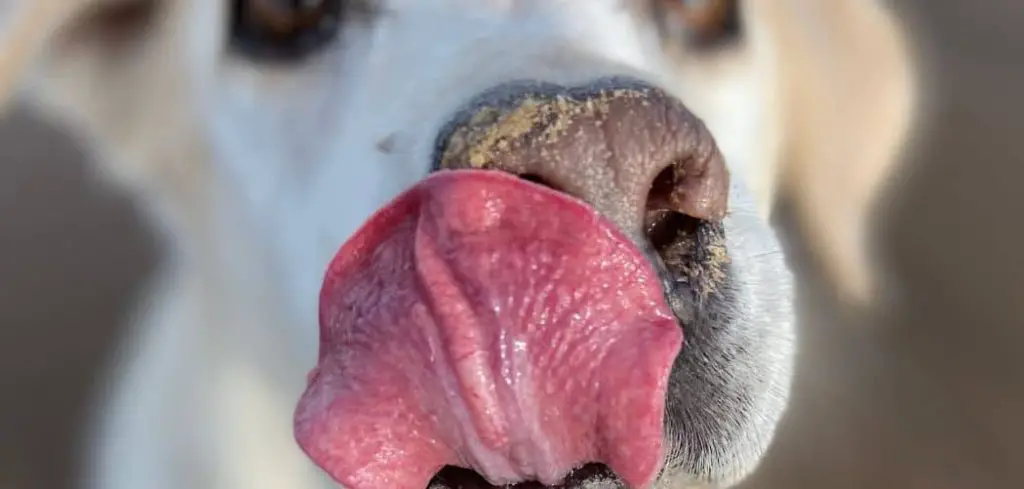It can be unsettling to notice your dog repeatedly licking at the air during the night when the house is quiet.
This unusual behavior can raise concern, especially if it happens regularly or suddenly begins in an older dog.
We outline the common causes of excessive air licking in dogs at night, what you can do, and when to seek veterinary help.
Dog Licking Air Excessively at Night — Why It Happens
A dog may excessively lick the air at night due to gastrointestinal discomfort, dental problems, nausea, or even neurological conditions. Anxiety and compulsive disorders can also trigger nighttime licking.
In some cases, underlying pain or an undiagnosed medical condition could be at play, making it important to pay attention and not dismiss the behavior.

Dog Licking Air Excessively at Night: Common Causes
Gastrointestinal Upset
One of the most frequent reasons dogs lick the air excessively is stomach or digestive trouble. When acid reflux or nausea sets in, dogs may lick at the air as a way to cope with the uncomfortable sensation.
Owners may notice additional signs like gulping, drooling, or grass eating during the day.
At night, the symptoms can feel worse because the stomach is empty, triggering more frequent air licking. Left untreated, ongoing GI upset can lead to poor appetite, weight loss, or esophageal irritation.
Read more: Dog Drooling Excessively at Night (Why it happens)
Nausea and Vomiting
Dogs that feel nauseated may start licking excessively at the air, even before vomiting occurs. Nausea can stem from many causes, including infections, kidney or liver disease, or toxins.
At night, nausea may be heightened due to dietary issues or metabolic changes, and the licking may precede or follow episodes of retching.
This is a red flag that should not be ignored, especially if combined with appetite loss or lethargy.
Dental or Oral Pain
Oral issues are another major cause of air licking. Dogs with gum disease, broken teeth, or mouth ulcers may lick at the air in an attempt to soothe pain or irritation.
Because pain worsens when the household is calm and there are fewer distractions, nighttime is when oral discomfort often becomes most noticeable. You might also see drooling, reluctance to chew, or pawing at the face.
Anxiety or Stress
Some dogs lick excessively at night due to stress or separation anxiety. When the home is quiet and the family is asleep, anxious dogs may develop repetitive habits like air licking as a form of self-soothing.
This behavior may appear alongside whining, pacing, or difficulty settling down. Left unchecked, stress-related licking can become compulsive, continuing even in calmer situations.
Neurological Conditions
In more serious cases, neurological disorders can trigger unusual repetitive movements, including air licking. Conditions such as partial seizures, canine cognitive dysfunction (dog dementia), or other neurological issues may cause these nighttime episodes.
These cases often include other concerning signs like disorientation, staring spells, or difficulty walking. A veterinary exam is necessary to determine if neurological issues are involved.
Pain or Discomfort
General pain from arthritis, abdominal discomfort, or internal issues can also lead to nighttime licking. Dogs often show unusual behaviors when they are uncomfortable, and licking at the air can be one such response.
Pain tends to worsen at night when dogs are lying still, which may explain why the behavior becomes more apparent then.
What to Do If Your Dog Is Licking Air Excessively at Night
If you notice this behavior, start by observing carefully. Take note of when it happens, how long it lasts, and whether other symptoms (like drooling, gagging, or pacing) are present.
You can try offering a small bland snack before bedtime, such as a bit of plain boiled chicken, to help calm stomach acid. Make sure your dog has access to fresh water throughout the night, and avoid feeding spicy or fatty foods that could worsen nausea.
Keeping your dog’s nighttime environment calm and stress-free may also help. If anxiety is suspected, providing a comfortable bed near you or using calming aids like pheromone diffusers may reduce the licking.
However, if the behavior is persistent or worsening, home care alone may not be enough.
When to Call or Visit Your Vet
If your dog’s nighttime air licking is accompanied by vomiting, loss of appetite, diarrhea, weight loss, or lethargy, it’s time to call the vet. These signs may point to serious underlying health issues.
Sudden excessive licking in older dogs should also be taken seriously, as it may indicate dental disease, gastrointestinal disorders, or neurological decline.
Emergency veterinary attention is needed if the licking is paired with collapse, seizures, heavy drooling, or signs of severe abdominal pain.
In all cases, providing your vet with detailed observations will help them pinpoint the underlying cause more quickly and accurately.
Read more: Dog licking air excessively (Signs it’s serious)
Key Takeaway
Nighttime air licking in dogs is not just a quirky habit — it can be a signal of gastrointestinal upset, dental disease, anxiety, or even neurological issues.
While mild or occasional cases may improve with small changes at home, persistent or worsening symptoms require veterinary evaluation.
By observing carefully, addressing potential discomfort, and seeking timely medical advice, you can ensure your dog stays comfortable and healthy, even through the quiet hours of the night.
